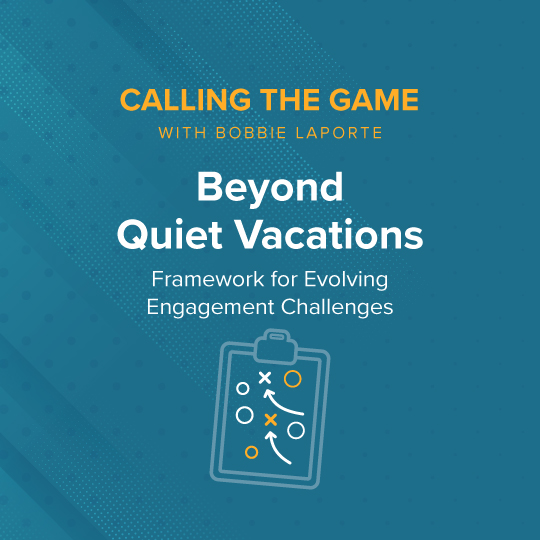First, there was The Great Resignation. Then came Quiet Quitting. And now, we’ve got Quiet Vacations. When it comes to employee engagement, it may feel like everything is changing—but it’s really not as complicated as you might think. Watch Bobbie LaPorte’s August 13 “Calling the Game” video to learn three fundamental truths that are rooted in neuroscience and our most universal human needs.
Science-Based Strategies to Combat Current and Future Disengagement Trends
It seems like every other leadership publication I come across has a new angle on how to address employee engagement.
This is not surprising…although it has become a more prominent topic since the pandemic. And that’s understandable since the whole employee/manager relationship and dynamic changed when everyone was working remotely.
And now that we are working in a mostly hybrid world, we have seen trends that reflect the continued lack of engagement – from The Great Resignation to Quiet Quitting to, most recently, Quiet Vacations – where employees use formal work holidays to create an extended “vacation” – working virtually without using PTO.
The recommendations, approaches and programs to address this continuing issue probably number in the hundreds. I am not an expert in this area, but I would like to offer a three-part, science-based, common-sense framework to build employee engagement that is based on foundational needs we have as humans.
- On the individual level: People need to understand what’s expected of them and how it plays to their strengths and the things they do well. This creates the predictability our brains crave while also giving them agency in their work.
- On a team level: Do team members support one another, and do they have a shared understanding of what success looks like for the team? This creates the sense of belonging that we all crave…. particularly in a remote working environment.
- On a company level: What is the employee’s connection to the broader organization, and is the mission exciting to them? This gives meaning to their work and a feeling that they are part of something larger than themselves.
Predictability and certainty, autonomy and personal agency, belonging and meaning—these are all human needs rooted in neuroscience that, when included in your relationships with your team, can significantly impact engagement. Even addressing one part of this framework can yield positive benefits that might surprise you.


